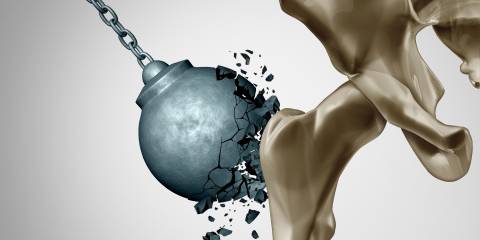The wardrobe downside of middle age? An expanding waistline, extra pounds, and a shape that’s more apple than hourglass. The metabolism of most Americans slows approximately 5 percent per decade, and the resulting one or two pounds of annual weight gain add up. As challenging as it can be to fight back, staying trim is worth the effort—for a lot more reasons than a wardrobe change.
Health Risks
Those who have big bellies in their 40s are much more likely to develop Alzheimer’s and other forms of dementia in their 70s than those who don’t. And women who gain more than 20 pounds after menopause increase their risk of breast cancer by nearly 20 percent. In addition, excess pounds in middle age significantly increase the risk of circulatory problems like high blood pressure as well as metabolic disorders like insulin resistance that can lead to type 2 diabetes, all of which are common in older Americans.
Why We Add Pounds
Increases in body mass index (BMI) or weight are underestimated in all age groups and weight gain occurs in all educational levels and does not stop at middle age. In women, weight gain and a redistribution of weight usually begin during perimenopause, the years leading up to menopause. Changing hormone levels account for some of the transformation, but so does the tendency to exercise less, eat more, and burn fewer calories.
Stress also triggers weight gain in many people. It’s common to gain weight after quitting smoking, and in some cases prescription drugs contribute to weight gain. According to Lawrence Cheskin, MD, director of the Johns Hopkins Weight
Management Center
- Some antipsychotic medications cause weight gain.
- Old beta blockers (e.g., Tenorim, Lopressor) and calcium-channel blockers that treat high blood pressure can lead to weight gain.
- Corticosteroids can add from a few to more than a hundred pounds to a patient’s weight over time.
- Insulin use can produce appetite-stimulating hypoglycemia.
Watch Your Waist
No matter what the contributing causes, middle-aged spread has two distinct phases. The first is weight gain, but that’s only part of the story. Next, muscle turns into fat, making it necessary to focus on one’s expanding waistline (a sign that fatty tissue is being deposited), as well as the bathroom scale.
While some age-related changes are inevitable, middle-aged spread isn’t one of them. Fight back by increasing your exercise level and enjoy more than one type of exercise.
Maximize Output
Lifting weights for about an hour at a time twice a week can prevent or slow middle-aged weight gain. In a University of Pennsylvania School of Medicine study, strength training with weights dramatically reduced the increase in abdominal fat in premenopausal participants. The researchers concluded that strength training efficiently prevents the small weight gains that normally accompany aging, while increasing muscle strength and allowing overweight people to increase their aerobic activity.
Yale University School of Medicine investigators found that, for every one-minute improvement in treadmill exercise time, participants lost 1.3 pounds compared with those whose treadmill endurance did not improve. More importantly, each one-minute improvement reduced the risk of middle-aged weight gain in both men and women.
Don’t feel like walking? Yoga is another way to prevent middle-aged weight gain. A study using data from 15,000 men and women ages 53 to 57 shows that of those who were overweight and practiced yoga for at least half an hour once per week lost an average of five pounds after four years. If that doesn’t seem like much, consider that of those who were overweight and didn’t do yoga gained 13 pounds! Yoga, the researchers conclude, offers a safe and comfortable way for people who have never been physically active to begin a program of regular exercise.
Then there are martial arts, like karate. In a study comparing the fitness levels of middle-aged martial arts practitioners with a sedentary control group, the martial arts practitioners showed greater aerobic capacity, balance, flexibility, muscle endurance, and strength, plus they had less body fat. Alternatives to traditional exercise can increase health and fitness in middle age.
With any aerobic exercise, add a few short, fast-paced bursts of speed to your workout. Pushing hard in short bursts reactivates nerve fibers, builds new capillaries, forces the body to repair muscle, and burns more calories.
Be Wise on the Input Side
If you’re already overweight and want to shed pounds, avoid crash diets because fasting and very low-calorie diets slow the metabolism even more than aging. Instead, try to consume between 1,200 and 1,500 calories per day from whole, plant-based foods for gradual, permanent, healthful weight loss. Your metabolism will slow less and almost all of the weight you lose will be fat rather than muscle. Don’t skip breakfast, though. Eating a hearty breakfast makes it easier to lose weight gradually.
Nutritional supplements make a difference, too. In one study, women slowed their postmenopausal weight gain by taking calcium/vitamin D supplements, particularly those already low in calcium. In a separate study, women ages 53 to 57 who took at least 500 mg of calcium per day gained 11 pounds after age 45, compared to 15 pounds for those who didn’t take the supplement. In yet another study, middle-aged adults who took multivitamins, vitamin B6, vitamin B12, and chromium gained less weight than their counterparts, especially if they were already overweight by age 45.





